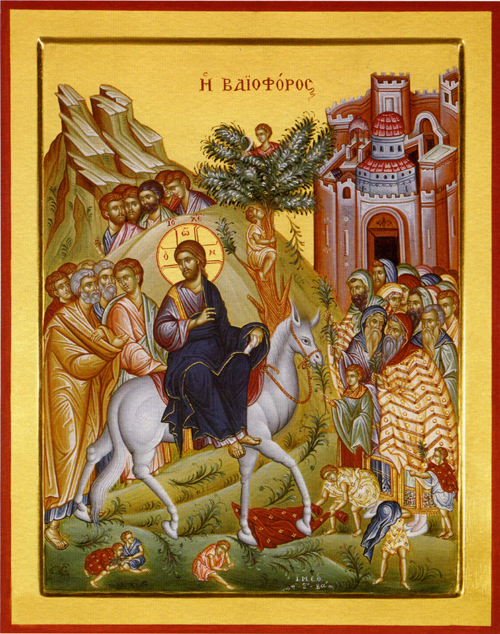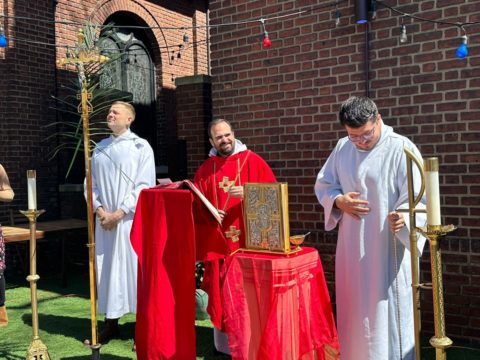Homily – April 2nd, 2023 – Palm Sunday of the Lord’s Passion, A
Mt 21:1-11; Is 50:4-7; Ps 22:8-9, 17-18, 19-20, 23-24; Phil 2:6-11; Mt 26:14-27:66
To the best of our abilities, pain should always be alleviated, eased, healed and if possible, of course, avoided. But many times we will run into inevitable crosses. And of course, in an outburst of sincerity, we can cry out to God: ‘My Father, if it is possible, let this cup pass from me’, which is totally natural, honest and human!
But the prayer of Jesus, in the midst of his uttermost agony, goes on, and within what is human and natural, He opens a window to the supernatural: ‘Yet, even if I am here expressing that I would rather not, not as I will, but as You will.’ And that’s when we get puzzled: all that evil that has happened to Jesus was the Father’s plan for Him?
When I suffer, is it the Father who doggedly wants to put me to the test? No! Things might escalate to the point that there will be inevitable crosses! And God’s plan, both for Jesus and for us, is the response that we can give to evil. It is not God’s plan that a series of disgraces come upon us, but it is part of His plan that we turn pain into love.
It’s not a passive resignation. But it is the confidence and the firm belief that there’s always an underlying plan of God, in spite of every evil we might provoke or undergo, even if we cannot see the bigger picture, there’s a plan of God that is being carried out, for the accomplishment of the greatest good of all, our salvation.
Evil is evil, but God knows how to draw out the greatest good from what is bad and as St. Paul says, He wants all people to be saved; so, He is constantly offering this plan of Salvation to you – in and through – all things that happen to you.
One thing that amazes me is that Jesus starts off this painful prayer by calling God His ‘Father’. He goes through His trial by clinging to the Father, as an invitation for us not to go through our pains as downtrodden people, but as children, children who trust in the Father when they’re passing through the storm, not desperate or hopeless, but confident.
Every story can become a story of salvation, an occasion to love, and a manifestation of God’s Love. EVERY STORY! When we cling to the Father we are enabled to react to pain as Jesus reacts: with silence, endurance, love and faith. And this is how Jesus turned a story of misfortune into a story of salvation.
The reality of our Salvation is filled with paradoxes of all kinds. Where we would least expect to find God, that is where we find Him.
The greatest glory is – mysteriously – to be found in the greatest poverty and annihilation. I like to say that the Gospel is like an ‘Opposite Land’ or the ‘Land of the Contrary’, so to speak, where the greatest is actually the smallest one; the truly rich is the one who is poor and empty; elevation comes from lowering and humiliation.
Actually, this off-putting logic rips us out of the parameters and standards of the world. In Jesus Christ, something different from the world comes into the ‘flesh’, into the ‘bowels’ of the world… to evangelize the world.
God ‘hides’ in human flesh, He is the little baby boy in a cave in Bethlehem; He is this unusual king who enters Jerusalem not riding a mighty horse, but who rides upon a colt, a little donkey; God is there, suffering and dying in a disfigured, apparently defeated, and Crucified man. We find God exactly where we would never look for Him!
No matter what you are going through right now that seems to be void of God’s presence, I invite you to look for Him within it, inside your pain, inside your loneliness, inside what is bitter, and you will find Him there, very close to you. You can find the thread of your salvation hidden in the misfortunes you undergo.
If God saved the world by means of the greatest of all crimes, the Cross of His Innocent Son, and reversed the evil that Christ suffered into salvation, our faith now reveals that even our hardships and disasters can give rise to Salvation!
Sometimes we fear because God remains speechless, and doesn’t tell us what to do or where to go. But in reality, God’s silence doesn’t mean distance, it’s actually a presence that is so radical and so close to us, that it can afford to be wordless.
During the Lord’s Passion, all our unnecessary words fall short, and the only and most eloquent Word that runs through the Liturgy is the Word of the Cross! We need to listen to the Cross. Jesus Crucified is the ultimate Word of love, the declaration of the Father’s Extreme Love for us. He is the ‘I love you’ of the Father spoken over us.
It’s intriguing for me that today’s Gospel starts off with something really ‘disgraceful’. The long narrative of The Passion and Death of Jesus according to the gospel of Matthew begins the voice, and the transactional mentality of Judas, which is totally opposed to love: What are you willing to give me if I hand Him over to you? In other words: What will be more convenient, easier, more enjoyable for me in exchange for my love for Jesus? What are you willing to give me?
In a world – and in a city like New York – where we learn that we need to strive to become ‘a number one, the king of the hill, the top of the heap’, we might fail to understand that our deepest needs aren’t satisfied by a pile of silver coins, but only the Love of God, revealed in Jesus Christ, can satisfy our deepest needs!
We don’t need to ‘bankroll’ God to prove how much we deserve to be saved. All our ‘hard work’ is to humbly welcome the embrace, the wide hug, that He offers us from the heights of the Cross. The greatest of all is actually the One who humbles Himself out of love. The Love of Christ reveals that true greatness is ‘being able to lower yourself out of Love’! In the perspective of love, the lower you go, the greater you are.
And today we see the ‘downward journey of God’, all the way down into our frailty, into our limitations, into our humanity with all its struggles. God travels the infinite distance between His Perfect Being and our imperfection to break down our prisons and set us free.
‘He didn’t regard equality with God something to be grasped. Rather, He emptied Himself, taking the form of a slave, He humbled himself, becoming obedient to the point of death, even death on a cross.’
The Son of God passes through the deadly Crosses of our wounded human history, He participates in what is ours from within, and fills our loneliness with His presence… the Holy, satiating presence of God. Tragedy is turned into an Act of Extreme Love.
When we read the Passion we see that no matter what we might be going through – there’s an occasion, an opportunity to Love. Everything we experience can turn out to be an occasion to trust in God, abandon ourselves to Him and do His Holy Will.
And once He touches the bottom of our misery, the Eternal Father highly exalts Him, giving Him a name above all names. And when Christ is exalted, when He is taken back to the heights, all of us are brought back to the Father. His Journey downwards is changed for us into a Journey Heavenwards.
But for whatever reason, which we don’t know exactly, Judas had lost faith and trust in the Love of Jesus. The tragedy that unfolded because of that loss of faith was, of course, massive. But it was also deeply personal.
It was personal for the other disciples who ran away. It was personal for Peter who abandoned the Master. It was personal for Pontius Pilate who allowed the Crucifixion to happen. It was personal for the soldiers who enjoyed the torture, and for the crowds below the cross.
In a way, the question Judas resounded in the hearts of all the players an characters in the picture: What are you willing to give me? Deep down inside, we so often have this mindset: What can I get from you, God, what can I get from your love and your power to make my life easier or to give me some kind of power in this world?
But it was also personal for Jesus, every step of the way. In His Way of the Cross, on that journey towards Death, Jesus took up the Cross and reversed the curse into Salvation, He reversed pain into love, but He also reversed and re-oriented the question of Judas. Through His Passion, Jesus is asking: “What am I willing to give you…?”
We see the bitterness of betrayal. And what is Jesus’ response before Judas? A gesture of predilection. ‘To dip his hand into the dish along with Him’. The guests of honor, the most intimate, were those who would dip their hand in the dish with the host. Jesus takes revenge on Judas by choosing and loving him to the end.
And when Judas comes to the Garden together with the soldiers, to arrest Him, Jesus calls him ‘Friend’.
I think that is what breaks our hearts at the beginning of this Holy Week. We are such sinners, so focused on ‘what’s in there for me?’; but Jesus never calls us by any other
name than ‘Friend’. He is fully committed to us to the very end. He wants to get Judas back! He looks at us today, He calls us Friends.
Jesus sees the heart of Judas and the heart of the other disciples. He sees the wickedness of his torturers and the weakness of Pontius Pilate. He sees – and feels – the soldiers come at Him, and sees that crowd below Him, that the other day was singing ‘Hosanna’ with praise, adoration, joy, and then, a few days later, shouts: ‘Crucify him’. How ambiguous and divided is our heart! But God keeps calling us friends!
And from the heights of the Cross, Jesus also sees us; and by dying up there, offering His life, turning pain into love, He said: Look at what I am willing to give you.
Fr. Cristiano Pinheiro C. Bede Shalom Catholic Community
New York, April 2nd, 2023 – Palm Sunday, A


